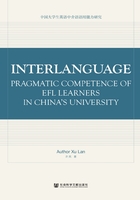
1.1 Background of the Study
Misunderstanding is a central issue in interlanguage pragmatics,which may easily occur among people from different cultural backgrounds. According to the National Language Research Institute(Shinpro ‘Nihongo’ Dai 2-han,1999a;1999b),different language speakers interpret pragmatic behaviors differently due to different cultural backgrounds. Nishihara(1999)stated that pragmatic standards for a culture or a country are not universal. Thus,when we conduct an international or intercultural studies,we need to be cautious to avoid overgeneralizing our own beliefs. Misunderstanding between a native speaker(NS)and a learner can naturally occur very often because of the learner’s weak understanding of the target culture’s pragmatics.
It is easy for EFL learners to be influenced by their mother tongue. Pragmatic transfer is a quite common phenomenon for EFL learners. It is the transfer from the first language socio-cultural communicative competence to L2 pragmatic behaviors(Takahashi & Beebe,1987). Although positive transfer can facilitate the acquisition due to the influence of cross-linguistic similarities,negative transfer will cause errors and result in a divergence between native and non-native speakers in the performance of a language. In conducting speech acts,EFL learners can make all kinds of mistakes,including the wrong selection of speech acts,non-typical expressions,an unsuitable amount of information,and inappropriateness for formality,directness and politeness. In understanding implicature,EFL learners may interpret the meaning of an utterance in the wrong way. In performing routines,EFL learners may embarrass the native speakers or feel embarrassed for breaking the rules of the target language.
In China,the majority of students consider that the purpose of learning English is to pass all kinds of English examinations,so as required in most national English examinations,they grasp enough grammatical knowledge,memorize a large number of words,and do listening,reading and writing exercises frequently for achieving high scores. Appropriate use of English is not included in most China’s national tests for university students,including CET 4(College English Test Band 4),CET 6(College English Test Band 6),TEM 4(Test for English Majors Band 4)and TEM 8(Test for English Majors Band 8). Thus,communicative English is their weak point,even for English majors. On the one hand,the students do not consider communication important for their scores;on the other hand,either teachers or students in China pay little attention to correcting errors in communicative English,so some non-habitual or non-standard use of English that left uncorrected could be a problem for the students for many years. As Liu(2004)pointed out that in China,it is a common phenomenon for an English learner to receive over 600 points in the Test of English as a Foreign Language(TOFEL)and over 2000 in the Graduate Record Examination(GRE)but still not know how to make a simple request in English in real communications. The EFL learners’ ability in communication is a problem that has attracted the attention of many researchers in China. In 2015,Yue stated that the EFL learners’ communicative ability is very weak in China,even for the students who had achieved high ability scores in listening,writing and reading.